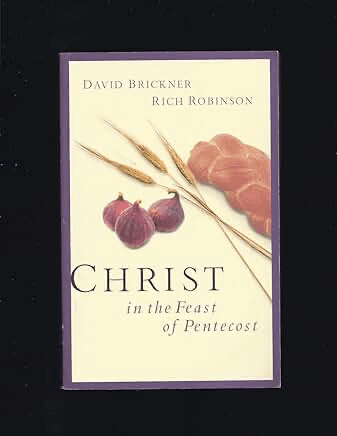
Shavuot: A Gift for God’s Covenant People
One of the seven God-ordained Feasts in Leviticus 23, Shavuot, is also called the Feast of Weeks. It’s a harvest festival, specifically the wheat harvest, a type of Biblical Thanksgiving. It celebrates God’s provision for our physical and spiritual needs. Jews mainly observe Shavuot, but Pentecost, Shavuot’s English name derived from the Greek, is celebrated in the Catholic and some Protestant churches today.

Why Shavuot?
The most apparent reason for celebrating Shavuot is that God commanded it. However, we can’t keep it exactly as it was commanded since there’s no Temple. It’s one of seven Feasts God told the Israelites to keep in Leviticus and one of the three in Deuteronomy (Deut. 16:16). It was to be observed 50 days (seven Sabbaths and one day) after the Day of First Fruits during the Feast of Unleavened Bread.
You shall also count for yourselves from the day after the sabbath, from the day when you brought in the sheaf of the wave offering; there shall be seven complete sabbaths. You shall count fifty days to the day after the seventh sabbath; then you shall present a new grain offering to the LORD” Lev. 23:15-16 (NASB)
When the Egyptians enslaved the Hebrew people, God brought ten plagues upon their captors. The last of these was the plague of the firstborn, in which the firstborn in each household died, except that of the Israelites. Out of obedience to God’s instructions, they painted the blood of a lamb on their doorposts and were then passed over by the final plague. The death of the firstborn finally caused the Pharaoh to let the Israelites go. After they left Egypt, they crossed the Red Sea and headed out into the desert.
It was 50 days after the Passover in Egypt when the Hebrew people were camped at the foot of Mount Sinai, that God gave the Hebrew people the gift of the Torah. Having been freed from slavery, they were free to serve God, and He chose this time to finalize His covenant with them by giving them His Law.

Likewise, 50 days after Passover, Shavuot is to be celebrated. The Day of First Fruits, or Yom HaBikkurim, during the Feast of Unleavened Bread, is when the counting of the omer began. On this day, the priest would wave a sheaf of green barley, an omer, to start the count. A male lamb would also be sacrificed, and God’s people would count up to Shavuot. Today, some Believers celebrate not only the First Fruits but the next 49 days also as days of spiritual introspection. Since these days lead up to the day God’s Law (the Torah) was given on Shavuot, these days are preparation to receive the word of God.
“But this is the covenant which I will make with the house of Israel after those days,” declares the Lord, “I will put My law within them and on their heart I will write it; and I will be their God, and they shall be My people.” Jere. 31:33 (NASB)
Jeremiah prophesied that God would make a new covenant with His people, in which the Law would be on their hearts.
Jesus also prophesied the gift of the Holy Spirit in Acts 1.
“Gathering them together, He commanded them not to leave Jerusalem, but to wait for what the Father had promised, “Which,” He said, “you heard of from Me; for John baptized with water, but you will be baptized with the Holy Spirit not many days from now.” Acts 1:4-5 (NASB)
In the New Testament, the apostles of the early church observe Shavuot, which is then called Pentecost, which is derived from the Greek word meaning “fiftieth.” While gathered for Shavuot, in celebration of God giving His law to them, God chose this time to give the gift of His Spirit to His people.
“When the day of Pentecost had come, they were all together in one place. And suddenly there came from heaven a noise like a violent rushing wind, and it filled the whole house where they were sitting. And there appeared to them tongues as of fire distributing themselves, and they rested on each one of them. And they were all filled with the Holy Spirit and began to speak with other tongues, as the Spirit was giving them utterance” Acts 2:1-4(NASB)
None of this is a coincidence. The apostles knew what and why they were celebrating on Shavuot, and the timing of God giving His Spirit wasn’t lost on them. Having been newly freed from the slavery of their sin, it had come time for God to finalize the New Covenant with His people. Jesus had been crucified 50 days before to atone for our sins, ushering in a way for sinful, imperfect people to commune with a Holy God. God then solidified this New Covenant by giving us His Spirit and writing His Word on our hearts, just as He promised 1,200 years prior!
So, while Jews have gathered for Shavuot from the time of Moses to the early church in Acts and still celebrate it even today, it has meaning for Gentile Believers also. As the grafted-in or adopted people of God, the promise of the New Covenant is for us and the people of Israel. When we recognize Jesus as Messiah, we enter a Covenant with God and have not only His Torah but also His Law written on our hearts through His gift of the Holy Spirit.
Sounds like a reason to celebrate, right!?
If you’d like to explore Shavuot and Pentecost more deeply, I recommend Christ in the Feast of Pentecost by the Senior Researcher and Executive Director of Jews for Jesus. It’s a quick read but very informative.
Comment
-
Explaining The Chosen: Season 1, Episode 5: The Wedding Gift by Holly Eastburg | Crossmap Blogs[…] The two other pilgrimage festivals (Shalosh HaRegalim – שלוש רגלים – in Hebrew) are Shavuot and […]
Leave a Reply Cancel reply
Search
Recent Comments
- Holy Branches on Explaining The Chosen: Season 2, Episode 1: Thunder
- robert silvernail on Explaining The Chosen: Season 2, Episode 1: Thunder
- Robin Meyer on Explaining The Chosen: Season 3, Episode 3: Physician Heal Yourself
- Joe on The Names of God: יהוה, the God of Israel
- Bradford on 9 Hebrew Words to Bring You Closer to God




